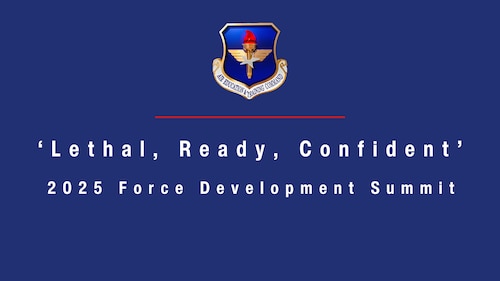Air Education and Training Command officials brought together experts and leaders to discuss the future of training and development within the Air Force during the command's annual Force Development Summit here March 25, with a keen focus on building a more ready and lethal force.
Hosted on-site for local attendees and virtually for those outside the area by AETC/A3K, the summit underscored AETC's commitment to forging a highly skilled and adaptable force ready to meet any challenge.
Lt. Gen. Brian Robinson, commander of AETC, opened the summit by emphasizing the importance of developing Airmen who are lethal, ready and confident by providing meaningful feedback and development opportunities to cultivate their skills and prepare them for increasingly autonomous roles.
"We can't underestimate the impact that force development has on the readiness of our Air Force," Robinson said while discussing the shared continuum and the interconnected nature of institutional and operational training. "This process requires a constant flow of information and adaptation between how Airmen are trained initially and how their skills are developed and sharpened in the field. What's learned and experienced during operational training should also feed back into the institutional side of training."
Robinson also emphasized the importance of data in understanding training effectiveness, Airmen's competency levels and system capacity.
"Our recent experience with competency mapping in the Future Undergraduate Pilot Training program demonstrates the power of this approach," Robinson said. "By scientifically mapping the skills and knowledge needed for holding patterns, we were able to optimize the number of practice repetitions required in the T-6 phase, ensuring both proficiency and efficiency. This data-driven approach, combined with operational feedback, is allowing us to build a more effective training program for our future pilots."
The general also encouraged attendees to explore concepts and best practices from other organizations, even outside the military, to improve efficiency and effectiveness despite resource limitations.
Key themes from the summit included:
Harnessing the power of technology
The summit highlighted the potential of emerging technologies like artificial intelligence (AI) in revolutionizing training and development. Dr. Wendy Walsh, AETCs Chief Learning Officer, detailed how the Enterprise Learning Engineering Center of Excellence is spearheading efforts to integrate research-driven best practices in educational technology.
On the generative AI front, Lindsey Fredman and Master Sgt. Adam Roush from the Air Force Career Development Academy team at Second Air Force showcased how generative AI can personalize curriculum design and streamline training development.
Courtney Klement from the Air Force Research Laboratory at Wright-Patterson Air Force Base, Ohio, presented on specific role-based training guides designed to provide practical, accessible entry points to help the DoD workforce leverage generative AI technologies to reclaim time that can be put back on the mission safely and effectively.
One tool highlighted was NIPRGPT, a research experiment designed to understand and shape the responsible adoption of generative AI in a secure government setting. Klement noted use cases already in the system include simple business practices, human resources, productivity and performance enhancement, communications and more. The role-based training guides are available on NIPRGPT.
Developing agile and adaptive leaders
Daniel Quinn from HAF/A1 briefed attendees on the still in development Leadership Assessment Program, highlighting its data-driven approach to equipping future leaders with the skills needed in a complex global landscape.
Modernizing training approaches
The summit emphasized the need for modern, agile training programs. Lt. Col. Robert Buckley and Ashley Topping from the 19th Air Force Flying Training Center of Excellence showcased how competency mapping and data analysis are informing the development of the T-6 Undergraduate Pilot Training syllabus, ensuring a more targeted and effective training experience.
Recognizing and Cultivating Specialized Skills
Recognizing the importance of specialized skills to overall readiness and operational effectiveness, the summit addressed the need to identify and leverage the untapped potential within the force. Brandon Walker and Roxanne Porter from Headquarters Air Force/A1 discussed incentivizing Airmen to formally certify their foreign language proficiency.
Porter also joined Kellye Richardson from Headquarters Air Force/A1 in addressing the need for a formal process to track enlisted regional expertise and cultural skills identifiers, crucial for global force management.







